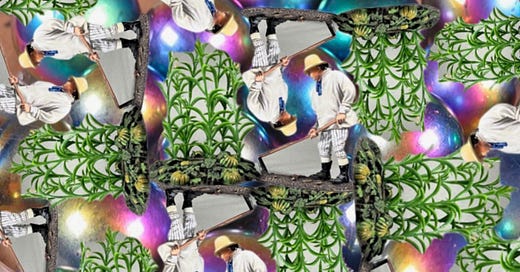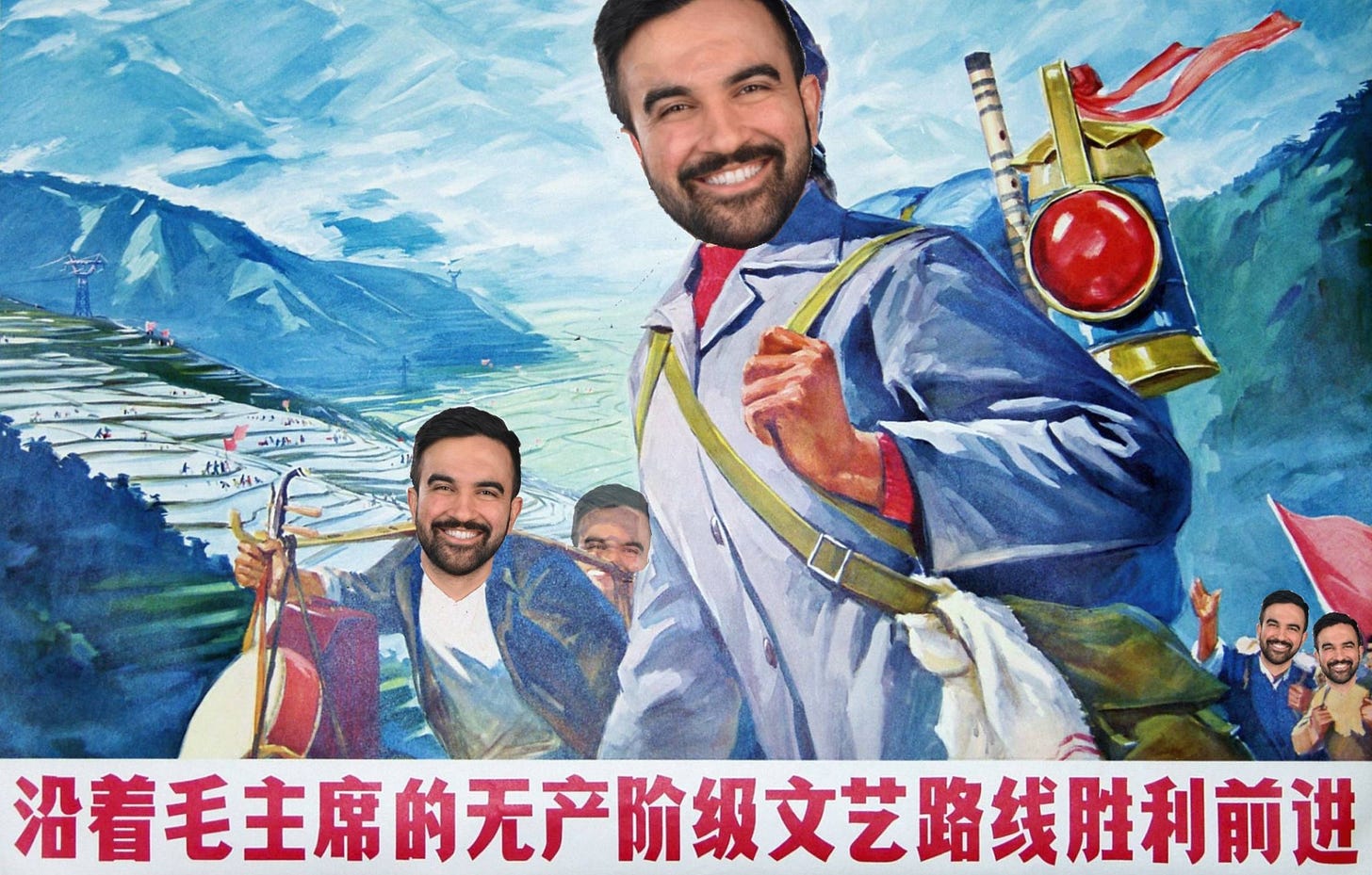Let’s start with some history. In turn of the century Mexico, the peasant Emiliano Zapata led villagers in the state of Morelos for almost a decade in arduous political struggle. By the end, he sought full expropriation of the land and political dominion for the working people of the state. But he started advocating for much more modest demands - recognition of land and water titles in his small village. In the decade of political turmoil that became known as the Mexican Revolution, Zapata’s cause took shape. There were alliances and betrayals, coups and counter-coups, foreign intervention and internecine brawls. History doesn’t take the simplest route. But Zapata was steadfast, and through the years of repression and revolt, victories and defeats, his people gained political consciousness. They didn’t just want their stolen farms back: they wanted to be free. This appetite, once acquired, is something that can only be sated, never dispelled. At the end of all of this, Zapata was assassinated. But while the state of Morelos won great strides toward equality and freedom, over the subsequent decades it slid back toward exploitation.
In some forms of political thought, human progress has an endpoint. It might be a communist utopia, it might be the complete dominion of markets and liberal capitalism, or it might be some sort of techno-fascistic hell, but many of the greatest thinkers have theorized and wished for an ‘end to history.’ I’ve always been skeptical of this; I think that struggle is more of a feature of human development than a phase.
How to gain historical consciousness when our beloved algorithms are so seductive, luring us into an eternal present-tense? There is no Get Ready With Me While I Study Class Conflict (although there probably, unfortunately, is). Especially in the Trump era, the instinct toward Monitoring the Situation becomes a compulsion, as if your own safety is at stake if you fail to stay engaged.
For me, reading a freaking history book is the best antidote for this. Not only because it replaces the time scale of hours or days into decades or centuries, but also because it reminds me always of how little I actually know (that is overwhelming in it’s own way, but maybe that’s a different topic). But one thing that becomes clear is that the great shifts happen very gradually, against immense resistance and re-entrenchment, and then very quickly, almost all at once.
I was thinking about history as I watched the NYC mayoral democratic primary returns last month. I thought about it even more in the subsequent days and weeks, as right wing politicians (including many democrats) crashed out over it, acting like it’s end times for New York City, for America, for (somehow) Israel . Meanwhile, Zohran Mamdani is in every appearance likable, reasonable, humble to a fault.
I do mean that, because I often find myself wishing he would go for the jugular more. Even as he says he doesn’t think billionaires should exist, he says it in an almost self-deprecating fashion, offering rhetorical olive branches to the potential targets of his redistributive tax hikes, modest though they are.
I understand the reason why, though. We aren’t ready for all that, yet. Many have commented on just how far we are as a country from a real socialist movement. The left is fractured and aimless, locked out of governing, and the target of relentless political persecution by the Trump admin. And yet Zohran is for many a cause for real optimism.
This isn’t really because of his modest social-democratic policies. A handful of government run grocery stores won’t make much of a dent in affordability. Freezing the rent is great but not new, as de Blasio did it several times. Free buses and universal childcare are important but hardly revolutionary. Why, then, the crash outs? Why then this feeling of hope, which is above and beyond the election of other left wing democrats?
Before I answer, a quick clarification. The difference between social democracy and outright socialism comes down to political economy, or who has actual power. Social democracy offers generous welfare without really reconfiguring who’s in charge. Socialism recognizes that welfare will always be vulnerable as long as the plutocrats maintain control. While Zohran didn’t run on any authentically socialist politics (in fairness, it’s tough to propose Land Reform in the world’s financial capital), he has become a flash point largely because he refuses to show deference to power, be that the Israel lobby, the Real Estate lobby, or the Apartheid Defense League. When he wins (and overwhelmingly at that), he exposes how shoddily constructed are the apparatuses of control. What makes Zohran such a terrifying figure isn’t really his race (although that’s a nice multiplier), it’s because he refuses to sell out and doesn’t seem to be suffering from it. In fact, it’s probably the reason he’s risen meteorically. It’s the source of his juice, his chi, his aura.
What is aura in politics? In my view, it’s pretty simple: it’s the ability to speak truth to power combined with the ability to win. It might feel like an eternity ago, but this was the feeling of the 2016 Republican primary. Trump emerged as an outsider truth-teller, a juggernaut of political inevitability that the chattering class could not keep at bay. It is that latter aspect, that feeling of inevitability, when people start piling on the bandwagon and it achieves escapes velocity, that speaks to a real master of the game. Trump has also managed to, whether miraculously or out of some preternatural instinct, maintain that image to his followers. Even as he accumulates more power than maybe anyone ever in this country, people still think he is telling those deep truths against the deep state.
Zohran is a winner. He has that undeniable thing - aura. When people come at him, they are liable to crash out, to implode, to drown in their own reactionary cynicism. Zohran-derangement syndrome.
Rent’s too high? Freeze it. Groceries too expensive? Public option. Should Israel exist? Only as all states should exist - free and equal. See the harder, Kirsten Gillibrand. It’s silly to say the future of politics is memes, because politics were memes long before Trump’s White House posted the Ghibli Deportation AI. Not just in the sense of viral images, but in the original sense of the memetic as repetition, as discrete cultural units designed to self-replicate. This is what aura speaks to - that exponential nth factor of repeatability, the latent potential for an idea to spread. When the class war comes, it will come in meme form.
Let’s game it out a bit more. Maybe the billionaires do flee the city, or some grocery stores close shop in protest. This is called a capital strike, and it’s designed to cow working people into believing that they exist out of the generosity of the wealthy. It’s what they tried against Allende in Chile, and his country improved dramatically under socialist rule regardless. What if there’s more escalation: Trump deports Zohran, or there’s even a federal takeover of NYC. Allende was also deemed too successful, and he lost his life in a CIA plot.
History is inconclusive about how these things turn out. Sometimes, the despot is able to centralize power, neutralize the opposition, demoralize the public into acquiescence. I don’t really see it in this instance. The genie is out of the bottle on Israel - the Hasbara propaganda just doesn’t play like it used to. Zohran could be defeated in any number of ways, from violence to cooptation, but the progress of history, the consciousness of the people, will only heighten in any outcome. Maybe next time, the concept of ‘class war’ will be more familiar, even welcome, to people who aren’t grocery store magnates or Airbnb slumlords.
Marxism emphasizes the convulsions of history, the reactions and counter reactions that push us into the future. But one thing that Marx missed, that people like Lenin later understood, is that class struggle happens in the context of specific individuals. It is precisely the charismatic leaders that help bring people into the cause, point them in the right direction, inoculate them against the forces of nihilism and cynicism that are really phantoms of capital itself. Obviously the charismatic-leader-model is hardly foolproof, but it is ultimately necessary. The leaderless protests of the last 15 years have shown us that change doesn’t just ‘happen.’ Someone, or someones, have to make it so.
For the moment, Zohran is who we’ve got. His aura is not some gimmick of TikTok or an attractive smile (although, come on) - it comes from the material promises of his campaign. It is only the context of a lying, propagandizing media and political system that he becomes so important, though. And the harder they try to stop him, the cooler he seems.
Zohran could still fail in any number of ways, but remember he’s just a single participant in history. There will be more after him who learn to speak truth to power, who don’t mince their words. They, too, will be sick as hell.
In the background of ICE raids and Medicaid cuts, Trump continues a less obvious war on the middle classes. Once stable careers in the medical, legal, technical, and government sectors have been drastically undermined already. In the race toward full AI-slopification, it is the lower strata of the Professional Managerial Class, the email and spreadsheet jobs, low level coders and petty bureaucrats, that have become the most vulnerable. If you are reading this, that’s probably you!
White collar industries are quietly shedding jobs. Capital tends toward monopoly, and whatever guardrails we had are now completely gone. The wealthy are gobbling up the entire pie. Trump wants what many left-communists have sought in the past - a broad proletarianization of the country. He wants us in the factories. He wants us in debt peonage from our ChatGPT subscriptions that we pay off in MELANIA coin.
If you don’t know whether or not you are on the winning side of this, you definitely aren’t. It doesn’t matter if you’re ready for it, because the class war has already started. And history has a tendency to speed up. There are decades of mid-posting before the one viral banger.
Despite the zoomer slang, aura can’t really be farmed. Which is to say, you’ll never become cool by trying to be cool. But aura can be put to use. It can be made a weapon. When we collectivize the aura farms, what was once unthinkable quickly becomes inevitable. When people gain the vocabulary to articulate the conditions for their freedom, they don’t forget it. And when the dispossessed are given a vital politics, it is, as they say, Joever.






